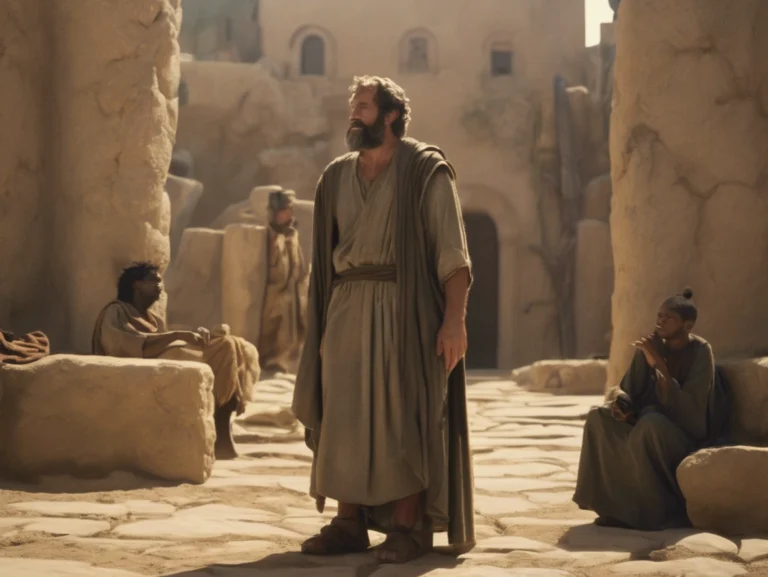James chapter 2 delivers a powerful message about the relationship between faith and works. While many Christians debate whether salvation comes through faith alone or requires works, James makes it clear that genuine faith naturally produces action. Let’s explore what it means to have a faith that’s alive and active.
Can Faith Without Works Really Save You?
James begins this passage with a challenging question: “What good is it, my brothers, if someone says he has faith but does not have works? Can that faith save him?”
The answer is clear – faith is demonstrated by actions. James thought it impossible that someone could genuinely have saving faith without works being evidenced in their life. True faith isn’t just intellectual agreement; it’s a transformative force that compels us to act.
Many people today like to appear religious or spiritual but show no evidence of true faith:
- Some don’t want to commit, just attendOthers enjoy the benefits of church without contributing
- Many claim to follow Christ but refuse to participate in church community
Jesus addressed this directly: “Not everyone who says to me, ‘Lord, Lord’ will enter the kingdom of heaven, but the one who does the will of my Father who is in heaven.”
What Does Dead Faith Look Like?
James provides a practical example: “If a brother or sister is poorly clothed and lacking in daily food, and one of you says to them, ‘Go in peace, be warm and filled,’ without giving them the things needed for the body, what good is that? So also, faith by itself, if it does not have works, is dead.”
True faith is alive and active. When we encounter someone in need and have the means to help but choose not to, our faith is revealed as lifeless. As the Apostle John wrote, “Little children, let us not love in word or talk, but in deed and in truth.”
This doesn’t mean helping the homeless is the only expression of faith. God equips each church with different people having different gifts. The key is allowing God to use you according to how He’s designed you. When we resist opportunities to serve – whether due to discomfort or inconvenience – we miss chances for our faith to grow.
Can You Separate Faith From Works?
James continues: “But someone will say, ‘You have faith and I have works.’ Show me your faith apart from your works, and I will show you my faith by my works. You believe that God is one? You do well. Even the demons believe—and shudder!”
Some in the early church claimed to have the “gift of faith” while others had the “gift of works.” James dismisses this false dichotomy. You cannot separate faith from works – if you can separate a person from their faith, they never had faith in the first place.
True faith impacts every part of our lives, informing our decisions and guiding our actions. Even demons believe in God’s existence and power – they’ve seen His glory! But mere intellectual belief isn’t saving faith.
The challenge is clear: we should never have to verbally announce we’re Christians in our workplace. People should recognize our faith by how we speak, act, and work. Our lives should demonstrate our faith without us having to declare it.
What Can We Learn From Biblical Examples of Living Faith?
James provides two powerful examples of living faith:
- Abraham (The Jewish Example)
- Faith is justified by works: Abraham was willing to sacrifice his son Isaac after waiting 100 years to become a fatherFaith is made perfect by works: Abraham’s obedience completed and strengthened his faithFaith draws us closer to God: Abraham became known as “a friend of God”
Rahab (The Gentile Example)
Life Application
- Faith comes alive through action: Rahab was a prostitute who risked her life to protect Israelite spies
- She had only heard stories about God’s power but believed and acted on that belief
- Her faith-driven actions saved her and her family when Jericho fell
The message of James 2:14-26 challenges us to examine whether our faith is truly alive. Here are some questions to consider:
- If people observed your life for a week without hearing you speak about your faith, would they know you’re a Christian?
- When was the last time you stepped out of your comfort zone because God was prompting you to act?
- Are there opportunities to serve that you’ve been ignoring because they’re inconvenient or uncomfortable?
- What would it look like for your faith to be “completed” by your works in your current season of life?
This week, challenge yourself to find one specific way to put your faith into action. It might be serving someone in need, volunteering at church, having a difficult conversation, or making a sacrifice. Remember that our faith comes alive when we step out and allow God to work through us.
True faith isn’t just what we believe—it’s what we do because of what we believe. As James reminds us, “Faith without works is dead.” Let’s pursue a faith that’s vibrant, active, and evident to all who encounter us.



